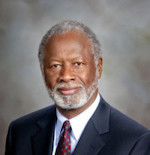
U.S. Vice President Kamala Harris attends an NCAA championship teams celebration on the South Lawn of the White House on July 22, 2024 in Washington, D.C. President Joe Biden abandoned his campaign for a second term after weeks of pressure from fellow Democrats to withdraw and just months ahead of the November election, throwing his support behind Harris. (Photo by Andrew Harnik/Getty Images)
This week, Democrats will begin a virtual roll call to nominate their presidential ticket ahead of Ohio’s certification deadline. But don’t blame Ohio, Secretary of State Frank LaRose insists, for the ad hoc process. In a letter to state and national Democrats, LaRose complains about “numerous media reports and interviews” in which the party cites Ohio to justify the changes.
“As the state’s chief elections officer, I’ve confirmed with our state’s attorney general that Ohio law does not require the DNC to conduct a “virtual roll call” prior to your scheduled August convention dates,” he wrote.
In a letter of his own, Attorney General Dave Yost adds that by moving the state deadline to Sept. 1, “The General Assembly fixed the Democratic Party’s timing problem.”
Problem solved, right?
Democrats and several election law experts say it’s not that simple.

How we got here
Ohio law requires political parties to relay their nominee to state officials 90 days before the general election. But that deadline is relatively new, and no state has one earlier in the process. Its track record isn’t great.
In 2010, Ohio lawmakers moved the deadline from 60 days to 90 days prior as part of legislation related to veterans, including the process for sending out absentee ballots. In the years since, only the 2016 presidential election has gone forward without lawmakers needing to make changes to the deadline.
In 2012 and 2020, both parties’ conventions landed after the deadline and lawmakers approved changes without issue. But this year, Republican state lawmakers wanted to extract concessions before approving any changes.
Eventually, the governor called a special session, and lawmakers approved a fix. But because Republican leaders tacked on legislation prohibiting foreign donations in ballot issue campaigns, they got no Democratic support. Democratic lawmakers insisted they had no problem banning foreign money, but the way Republicans were doing so would make it more difficult to organize a ballot issue campaign.
With no Democratic support, lawmakers didn’t have the votes for an emergency clause which would make the law take effect immediately. That means the law won’t take effect until September 1.
On social media, DNC Chair Jaime Harrison argued between the law’s late effective date and Republicans including unrelated provisions in the bill, Democrats aren’t willing to trust the fix.
“So are we supposed to rely upon the good will of those same people?!” he wrote. “Please. Don’t gaslight me!”
Legal insight
A trio of election law experts believe Ohio’s changes really would protect the DNC if it cancelled the virtual roll call and just went forward with its originally planned convention. But they also offered different versions of “better safe than sorry.”
Edward Foley from Ohio State University argued there would be “no basis” for keeping a Democratic nominee off the ballot so long as the party met the new deadline.
“Even if the Democrats were in noncompliance during the period before the new deadline takes effect, they would be in compliance once it does,” he said. “But if the Democrats can wrap up their nominations by the old deadline, why not comply with it, and thus remove the risk of even a frivolous lawsuit?”
“I think both sides are right,” Notre Dame law professor Derek Muller said with a laugh.

He discounted the likelihood of a GOP state official filing some kind of challenge but acknowledged that doesn’t mean an average voter couldn’t file some sort of lawsuit. In the end, Muller argued, that case wouldn’t go anywhere, but it might be messy and cast a negative light on the party.
“The whole point is that the DNC wants to avoid even the smallest hiccup both for legal reasons and for public relations reasons,” he said.
Jonathan Entin, a law professor at Case Western Reserve University, landed in a similar place.
“I think that the chances of a successful lawsuit are considerably less than even — but they’re not zero,” he said.
Entin argued with partisanship at a fever pitch, Democrats have at least some cause for concern. To see those dynamics, he said, you don’t need to look any further than the Secretary’s letter. While LaRose vindicated the state’s recent changes and assured Democrats their candidate would make the ballot, he went out of his way to criticize the party as well.
“I suspect your current rhetorical posturing is part of a plan to replace the incumbent president without a contested convention or any kind of democratic process,” LaRose wrote. “It’s clever, if not completely antithetical to your party’s relentless finger wagging about threats to democracy, but I ask that you stop using Ohio to justify your course of action.”
Entin colorfully acknowledged “politics ain’t beanbag,” but argued LaRose overstepped.
“(It) starts out to be a perfectly straightforward statement,” Entin described. “Look, the legislature has done this, this is going to work — that’s all LaRose had to say.”
It’s a sad commentary, Entin argued, that “even something as simple as making sure that a major party presidential nominee is going to be on the ballot has degenerated into schoolyard taunts."
• • •• • •
This story is provided by Ohio Capital Journal, a part of States Newsroom, a national 501(c)(3) nonprofit. See the original story here.



















